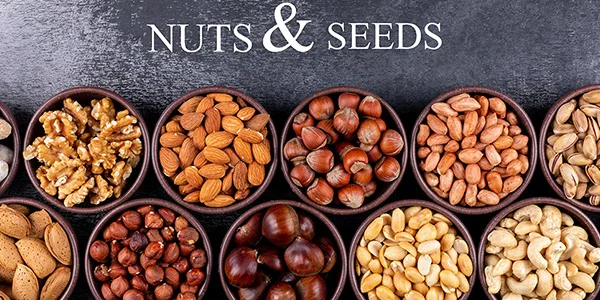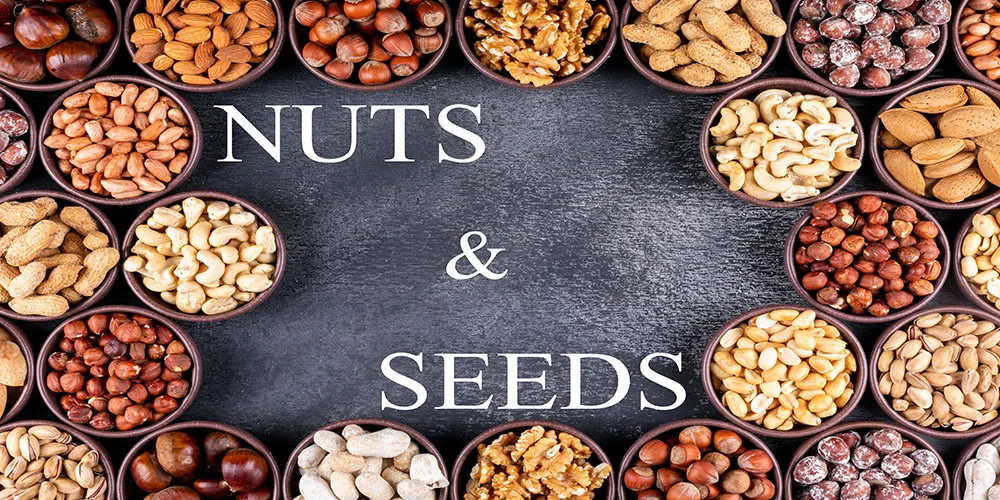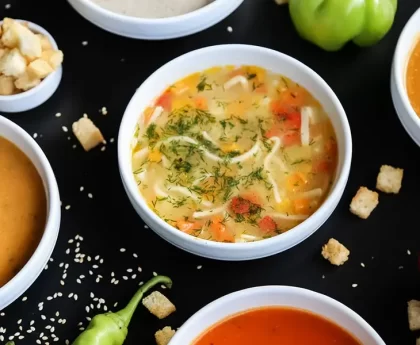Nuts & Seeds for Brain & Heart Health, Are edible, small-sized, nutrient-rich foods that are typically derived from plants. They are often consumed for their nutritional value and can be eaten on their own or incorporated into a variety of dishes. Here are definitions for both nuts and seeds:
Nuts:
Nuts are hard-shelled fruits or seeds of certain plants. They are typically characterized by a hard, woody shell or husk that surrounds the edible kernel or seed inside. Nuts are a good source of healthy fats, protein, vitamins, minerals, and dietary fiber. Some common examples of nuts include almonds, walnuts, cashews, and pistachios.
Seeds:
Seeds are the reproductive units of plants that are capable of developing into new plants under suitable conditions. In a culinary context, seeds are often used to refer to edible seeds that come from various plants, including fruits, vegetables, and grains. These edible seeds are rich in nutrients and can be consumed as part of a balanced diet. Examples of edible seeds include sunflower seeds, chia seeds, flax seeds, and pumpkin seeds.
It’s worth noting that while nuts and seeds are often consumed for their nutritional benefits, they can vary in terms of their nutrient profiles. Some are higher in healthy fats, while others are rich in protein, vitamins, or minerals. Additionally, the culinary and botanical definitions of nuts and seeds may differ in some cases, leading to variations in classification.
Types of Nuts & Seeds
Nuts and seeds come in a wide variety, each with its own unique flavor, texture, and nutritional profile.
Here are some common types of nuts and seeds:
Nuts:
- Almonds: Almonds are one of the most popular nuts and are known for their mild, slightly sweet flavor. They are rich in healthy fats, protein, fiber, vitamins, and minerals.
- Walnuts: Walnuts have a distinctive, earthy flavor and are a good source of omega-3 fatty acids, antioxidants, and protein.
- Cashews: Cashews have a creamy texture and a mild, sweet taste. They are rich in healthy fats, particularly monounsaturated fats, and provide vitamins and minerals.
- Pistachios: Pistachios have a slightly sweet and nutty flavor. They are known for their greenish color and are a good source of protein, fiber, and various nutrients.
- Peanuts: Technically legumes, peanuts are often considered nuts in culinary terms. They are rich in protein and healthy fats and are commonly consumed as snacks and in peanut butter.
- Brazil Nuts: Brazil nuts are large, with a rich, creamy taste. They are a good source of selenium, a mineral important for several bodily functions.
- Hazelnuts (Filberts): Hazelnuts have a sweet, nutty flavor and are used in various culinary applications, including chocolate spreads like Nutella.
- Macadamia Nuts: Macadamia nuts have a smooth, buttery texture and a mild, slightly sweet taste. They are rich in monounsaturated fats.
Seeds:
- Sunflower Seeds: Sunflower seeds are small and come from the center of sunflower heads. They are commonly eaten as snacks and are a good source of vitamin E and healthy fats.
- Chia Seeds: Chia seeds are tiny seeds known for their high fiber and omega-3 fatty acid content. They can absorb liquids and form a gel-like consistency, making them suitable for puddings and smoothies.
- Flaxseeds: Flaxseeds are rich in omega-3 fatty acids, fiber, and lignans. Ground flaxseeds are often added to cereals and baked goods.
- Sesame Seeds: Sesame seeds have a nutty flavor and are used in various cuisines, particularly in baking and as a topping for bread and buns.
- Pumpkin Seeds (Pepitas): Pumpkin seeds are often roasted and have a crunchy texture. They are a good source of protein, magnesium, and zinc.
- Hemp Seeds: Hemp seeds are highly nutritious and contain a balanced ratio of essential fatty acids. They are often added to smoothies and salads.
- Poppy Seeds: Poppy seeds are tiny and have a slightly nutty flavor. They are used as a topping in baking and cooking.
- Sesame Seeds: Sesame seeds have a nutty flavor and are commonly used in baking, cooking, and as a topping for bread and dishes like sesame chicken.
- Pine Nuts: Pine nuts have a mild, slightly sweet flavor and are often used in Mediterranean and Italian cuisine, particularly in dishes like pesto.
These are just a few examples, and there are many more varieties of nuts and seeds, each with its own unique taste and nutritional benefits. Incorporating a variety of nuts and seeds into your diet can provide a wide range of essential nutrients and add diversity to your meals and snacks.

Benefits of Nuts & Seeds
Nuts and seeds are highly nutritious and offer a wide range of health benefits when consumed as part of a balanced diet.
Here are some of the key benefits of including nuts and seeds in your diet:
- Rich in Healthy Fats: Nuts and seeds are excellent sources of healthy fats, including monounsaturated and polyunsaturated fats, which can help improve heart health and reduce the risk of cardiovascular disease.
- High in Protein: Nuts and seeds provide plant-based protein, making them a valuable source of protein for vegetarians and vegans.
- Nutrient-Dense: Nuts and seeds are packed with essential vitamins and minerals, including vitamin E, magnesium, potassium, and zinc, which contribute to overall health and well-being.
- Fiber-Rich: Nuts and seeds are high in dietary fiber, which aids in digestion, helps control blood sugar levels, and promotes a feeling of fullness, potentially assisting in weight management.
- Antioxidant Properties: Many nuts and seeds contain antioxidants, such as vitamin E, selenium, and phytochemicals, which help protect cells from oxidative damage and reduce inflammation.
- Heart Health: Consuming nuts and seeds has been associated with a lower risk of heart disease, as they can help reduce levels of “bad” LDL cholesterol and lower blood pressure.
- Weight Management: Despite being calorie-dense, nuts and seeds can be part of a weight management plan because their combination of healthy fats, protein, and fiber helps control appetite and cravings.
- Brain Health: Omega-3 fatty acids found in certain nuts (e.g., walnuts) and seeds (e.g., flaxseeds, chia seeds) are important for brain health and cognitive function.
- Bone Health: Nuts, particularly almonds, are a good source of calcium and magnesium, which are essential for strong bones.
- Blood Sugar Control: Nuts and seeds may help stabilize blood sugar levels, making them beneficial for individuals with diabetes or those at risk of developing the condition.
- Skin and Hair Health: Nutrients like vitamin E and biotin in nuts and seeds contribute to healthy skin, hair, and nails.
- Reduced Inflammation: Some nuts and seeds, such as almonds and flaxseeds, contain compounds that have anti-inflammatory properties, which may help reduce chronic inflammation in the body.
- Digestive Health: The fiber in nuts and seeds supports digestive health by promoting regular bowel movements and a healthy gut microbiome.
- Reduced Risk of Certain Cancers: Some studies suggest that consuming nuts and seeds may be associated with a reduced risk of certain types of cancer, particularly when part of a balanced diet.
- Longevity: Regular consumption of nuts and seeds has been linked to improved overall health and increased longevity.
It’s important to note that while nuts and seeds offer numerous health benefits, portion control is key, as they are calorie-dense. Incorporating a variety of nuts and seeds into your diet can help you enjoy their nutritional advantages while maintaining a balanced intake of nutrients.
What are the facts about nuts and seeds?
Nuts and seeds are nutritious and versatile foods that offer a range of health benefits.
Here are some key facts and interesting information about nuts and seeds:
- Nutrient-Dense: Nuts and seeds are packed with essential nutrients, including healthy fats, protein, fiber, vitamins (such as vitamin E and some B vitamins), and minerals (such as magnesium, potassium, and zinc).
- Healthy Fats: They are excellent sources of heart-healthy monounsaturated and polyunsaturated fats, including omega-3 and omega-6 fatty acids, which contribute to cardiovascular health.
- Antioxidants: Many nuts and seeds contain antioxidants, such as vitamin E and selenium, which help protect cells from damage caused by free radicals and oxidative stress.
- Protein-Rich: Nuts and seeds are valuable sources of plant-based protein, making them suitable for vegetarians and vegans seeking to meet their protein needs.
- Fiber Content: They are high in dietary fiber, which supports digestive health, helps maintain stable blood sugar levels, and contributes to a feeling of fullness.
- Heart Health: Regular consumption of nuts and seeds has been associated with a reduced risk of heart disease, lower LDL (“bad”) cholesterol levels, and improved blood pressure control.
- Weight Management: Despite being calorie-dense, nuts and seeds can be part of a weight management plan because they promote satiety and may reduce overall calorie intake.
- Omega-3 Fatty Acids: Some nuts, like walnuts, and seeds, such as flaxseeds and chia seeds, are rich in omega-3 fatty acids, which are beneficial for brain health and inflammation control.
- Bone Health: Nuts, particularly almonds, are good sources of calcium and magnesium, important minerals for bone health.
- Anti-Inflammatory Properties: Certain nuts and seeds contain compounds that have anti-inflammatory properties, potentially reducing chronic inflammation in the body.
- Blood Sugar Control: They may help stabilize blood sugar levels, making them suitable for individuals with diabetes or those looking to manage blood sugar.
- Phytochemicals: Nuts and seeds contain various phytochemicals, such as lignans (found in flaxseeds) and phytosterols, which have potential health benefits.
- Allergies: Nut allergies are common, and it’s essential for individuals with nut allergies to be cautious and aware of potential cross-contamination.
- Variety Matters: Incorporating a variety of nuts and seeds into your diet ensures that you benefit from a wide range of nutrients and flavors.
- Preparation Methods: Roasting or toasting nuts and seeds can enhance their flavor, but it may reduce some of their nutrient content. Choosing unsalted and unroasted options can be a healthier choice.
- Portion Control: Nuts and seeds are calorie-dense, so portion control is crucial to avoid excessive calorie intake.
- Culinary Versatility: Nuts and seeds can be used in numerous culinary applications, including snacking, baking, cooking, and as toppings for salads and yogurt.
- Sustainability: Some nuts and seeds, like almonds and cashews, may have environmental considerations related to water use and land management in their production.
- Storage: To maintain freshness and prevent spoilage, store nuts and seeds in airtight containers in a cool, dark place or the refrigerator.
- Dietary Inclusion: Nuts and seeds can be incorporated into various dietary patterns, including Mediterranean, vegetarian, vegan, and paleo diets.
Incorporating a variety of nuts and seeds into your diet can contribute to a balanced and nutritious eating plan, offering numerous health benefits and culinary possibilities. Nuts & Seeds for Brain Health: Boosting Cognitive Function Naturally.
Which nuts and seeds are healthiest?
Many nuts and seeds are nutritious and offer various health benefits. The healthiest nuts and seeds can vary depending on specific dietary needs and health goals,
Here are some of the top options that are generally recognized for their nutritional value and positive impact on health:
Nuts:
- Almonds: Almonds are rich in monounsaturated fats, fiber, vitamin E, and magnesium. They are known for their heart-healthy benefits and are a good source of protein.
- Walnuts: Walnuts are high in omega-3 fatty acids, antioxidants, and fiber. They are particularly beneficial for brain health and reducing inflammation.
- Pistachios: Pistachios are a good source of protein, fiber, and healthy fats. They are known for promoting heart health and may aid in weight management due to their lower calorie content per serving.
- Brazil Nuts: Brazil nuts are exceptionally high in selenium, a mineral that supports thyroid function and has antioxidant properties. However, it’s essential to consume them in moderation due to their selenium content.
- Hazelnuts (Filberts): Hazelnuts are rich in healthy fats, fiber, and antioxidants. They can help lower cholesterol levels and support heart health.
Seeds:
- Chia Seeds: Chia seeds are an excellent source of omega-3 fatty acids, fiber, and protein. They absorb liquid and can be used to create a gel-like consistency, making them useful in recipes like chia pudding.
- Flaxseeds: Flaxseeds are packed with omega-3 fatty acids, lignans (which have antioxidant properties), and fiber. Ground flaxseeds are easier for the body to digest and absorb.
- Sunflower Seeds: Sunflower seeds are a good source of vitamin E, protein, and healthy fats. They are often enjoyed as a snack or added to salads and cereals.
- Pumpkin Seeds (Pepitas): Pumpkin seeds are rich in magnesium, zinc, and protein. They are known for their potential to support heart health and prostate health in men.
- Hemp Seeds: Hemp seeds are highly nutritious and provide a balanced ratio of essential fatty acids. They are a source of complete protein and are rich in vitamins and minerals.
- Sesame Seeds: Sesame seeds are a good source of calcium, iron, and healthy fats. They are commonly used in baking, cooking, and as a topping for various dishes.
- Pine Nuts: Pine nuts have a mild, slightly sweet flavor and contain healthy fats, protein, and essential minerals. They are often used in Mediterranean and Italian cuisine.
It’s important to note that portion control is essential when consuming nuts and seeds, as they are calorie-dense. Incorporating a variety of these nuts and seeds into your diet can provide a wide range of nutrients and health benefits. Additionally, individual dietary preferences, allergies, and health conditions may influence the choice of nuts and seeds that are best suited for a specific person.





